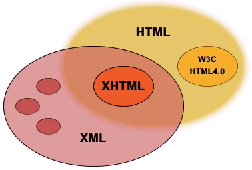XML is the foundation for several next-generation web technologies, such as XHTML, Ajax, RSS and Web Services. So it sounds like a good thing to know.
 While HTML (the language of the web) is used to display information (how data looks), XML is used to structure & describe information (what data is).
While HTML (the language of the web) is used to display information (how data looks), XML is used to structure & describe information (what data is).
XML is easy to learn, but comes with a set of related technologies, such as:
- XPath .. which is used to extract data from within an XML document (similar to how SQL works).
- XSLT .. a styling language which transforms an XML document/file into something else (such as HTML, PDF, ASCII or another XML file).
- XQuery .. provides advanced query functions on XML data, similar to SQL. More powerful than XPath.
- XPointer & XLink .. which work together to create hyperlinks to XML documents and to sections within XML documents (even if/when no named anchors exist, which is pretty cool).
So there's a lot to learn. (I'm about knee-deep into it.)
Since XML is just plain text, XML documents/files can be created or edited with any text editor, such as Notepad or Wordpad, which come with every version of Windows. But they provide no advanced features such as:
- line numbering
- tag completion
- syntax color coding
- checking for well-formedness
- validating XML files (against DTD & Schema)
- collapse & expand sections of code
I heard that the best (most feature-rich) XML editing software that's FREE is » Microsoft's Visual Web Developer 2008 Express Edition .. which I downloaded and installed.
Holy moly. Big download. Couple of gigs. They make you register the software, too. Took me a long time to finish everything .. after downloading all the updates (including the security patches & SP1, plus installing Microsoft's SQL Server 2008 Express).
••• today's entry continues here below •••
Another freebie is Microsoft's XML Notepad, which I learned about & installed just today. (Thank, Pleo.) So I haven't had a chance yet to take it for a test drive.
Not sure why W3Schools says you should know Javascript before tackling XML. Maybe I'll learn later. But so far, it doesn't seem to be a pre-req. (I know the basics of Javascript.)
Two high-end professional-grade XML editing tools are:
But many others exist. I originally started out with the intention to learn about XML .. but now I'm actually learning XML. And moving along steadily. Right now, I'm using Microsoft's (free) Visual Web Dev 2008 Express, but I'm gonna see how well editing goes with XML Notepad.
My biggest concern » seems you could work long-n-hard on an XML project .. only to discover (down the road) that the tag-system you devised is inadequate and you now need to implement major (time-consuming) revisions .. since XML (unlike HTML or XHTML) leaves the tag/element creation up to you.
I mean, you would certainly plan out your project as best possible. But I doubt you could/would think of everything up front. Hopefully I'll learn techniques and insights how to avoid this. But it seems like any XML project of any substance would almost certainly involve adapting to lessons learned along the way.
I'm already envisioning my own Rad mark-up language, with tags such as:
- <rad>
- <gnarly>
- <cool>
- <nuclearGrade>
- <geekified>
- <software>
- <hardware>
- <yummy>
- <fun>
- <books>
- <movies>
- <dreams>
- <politics>
For more along these lines, here's a Google search preconfigured for the query » xml learn edit
